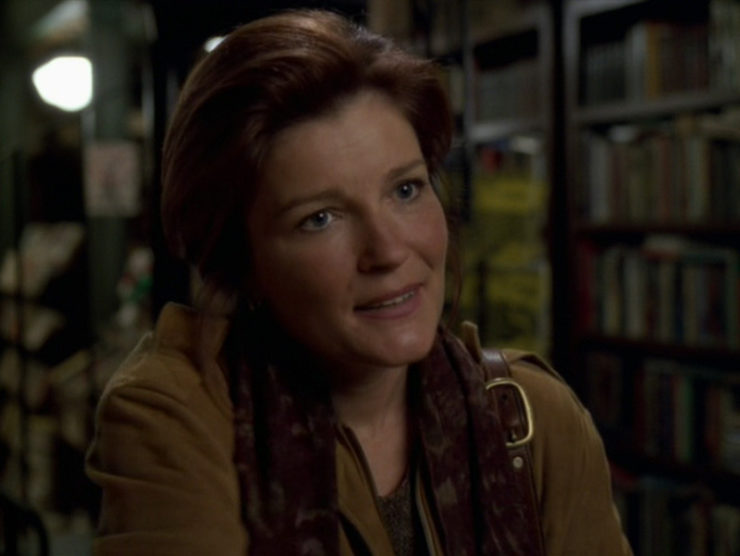“11:59”
Written by Brannon Braga & Joe Menosky
Directed by David Livingston
Season 5, Episode 23
Production episode 217
Original air date: May 5, 1999
Stardate: unknown
Captain’s log. Neelix talks to Janeway about the Great Wall of China—apparently, he and Paris are learning about each others’ homeworlds and challenging each other to trivia on the subject. This leads to Janeway asking him about the Millennium Gate, which one of Janeway’s ancestors worked on.
Janeway recalls the family stories about how Shannon O’Donnel was asked by the governor of Indiana to work on the project, and flew her in on a private jet. We then flash back to December 2000, where we see O’Donnel driving into Portage Creek, Indiana in a beat-up old station wagon, seeing signs for the Millennium Gate, but not knowing what it is.
Buy the Book
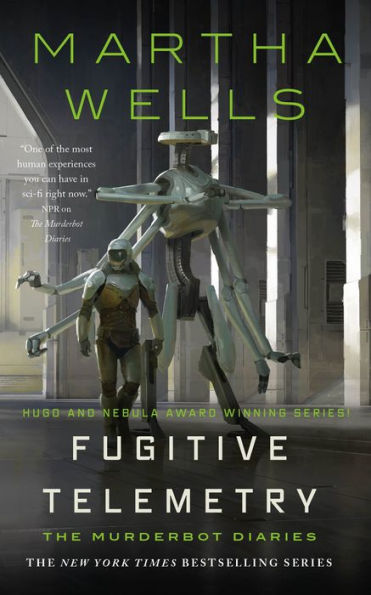

Fugitive Telemetry
She’s looking for a service station, but most of the businesses in town are closed. Then she rear-ends another car, and has to admit to not having insurance. The guy she rear-ended lets it go and drives off. O’Donnel’s not so lucky, as her station wagon won’t start.
After calling for a tow truck, she takes refuge in Alexandria Books, owned and operated by Henry Janeway, assisted by his son Jason. We soon learn that Henry is the lone holdout in town—every other business has sold their land to the Millennium Gate project. It’s being sold as a planned community that can be the basis of future communities on other worlds (which Janeway said in the twenty-fourth century was one goal the Gate accomplished), but Henry sees it as a fancy-shmancy shopping mall and nothing else.
Henry has flyers he’s been putting up around town speaking out against the Gate. O’Donnel offers to use her laptop to e-mail everyone in town, which she hopes he’ll pay her for, as she’s flat broke and needs to pay to fix her car. (How she can afford a laptop, which in 2000 cost a lot more than they do now, when she can’t even afford car insurance is left as an exercise for the viewer.)
Gerald Moss, who represents the company building the Gate, is interviewed by local news. Not only is Henry the only holdout, but if he doesn’t capitulate by the time the new year flips to 2001, they’ll have to consider an alternate location for the Gate. Henry is thrilled, as now he just has to hang on for a few more days.
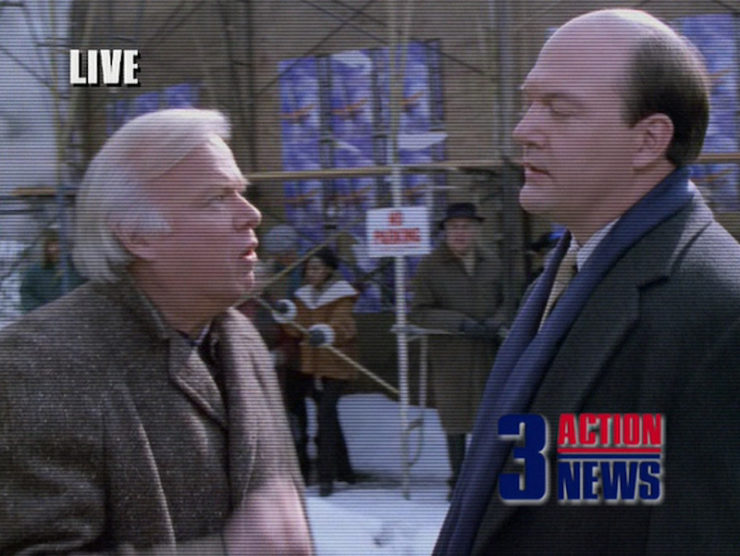
Back on Voyager, Janeway asks Seven to dig up information about the construction of the Millennium Gate, as most of the records are fragmentary. Janeway credits the family stories about O’Donnel as being a major influence on her decision to become a Starfleet officer. At Neelix’s suggestion, Seven expands her search to non-Federation sources, and they find a picture of an elderly Shannon O’Donnel Janeway with her children and grandchildren in a park. They also find a reference to the town of Portage Creek’s resistance to the Gate project.
In 2000, Moss comes to O’Donnel with a job offer. He knows that she washed out of the space program (another inaccuracy in Janeway’s family stories, as Janeway speaks of O’Donnel as being an astronaut), and her work as an engineer wasn’t respected. Moss is willing to make her a consultant on the Gate project, but only if she convinces Henry to sell the bookstore.
O’Donnel bonds with Jason over videogames and the Gate—Jason, unlike his father, thinks it’s cool—while Henry is off in Bloomington to buy stock, as the local suppliers won’t work with him, because he won’t support the Gate. When Henry returns, O’Donnel and he get into an argument about the Gate. She admits to the job offer, saying she doesn’t want to keep living out of her car, and Henry asks her to stay with him, but she doesn’t want to be stuck in his bookstore, either.
On Voyager, Janeway is disappointed to learn that most of what she thought she knew about her ancestor isn’t true. She wasn’t an astronaut, she didn’t work on any of the Mars missions, never even went to Mars, and it turns out that the only person who was against the Gate in Portage Creek was O’Donnel’s future husband. Chakotay urges Janeway not to be so hard on O’Donnel, as she had no way of knowing she’d need to live up to the expectations of her descendant the starship captain.
O’Donnel gets into her car to head out of Portage Creek. Moss says the job offer is still good, even though she didn’t get Henry to play ball, and Jason pleads with her to stay, but she drives off anyhow.
But after stopping for chocolate chip cookies, she turns around and comes back. A news crew and the police are outside Alexandria Books as the clock is moving toward the midnight deadline that will see the Gate officially moved to Canton, Ohio. She goes in to tell Henry that she realized that she didn’t want to continue her life without him, and that he needs to stop living in the past and do right by his son and the town, and he agrees at 11:59pm and everyone’s happy.
Neelix asks a despondent Janeway to the mess hall, where they’re celebrating Ancestor’s Day, a solemn and ancient holiday that Neelix just made up to make Janeway feel better. The crew remind her that O’Donnel is just as much of an inspiration even if she didn’t do everything she thought she did.
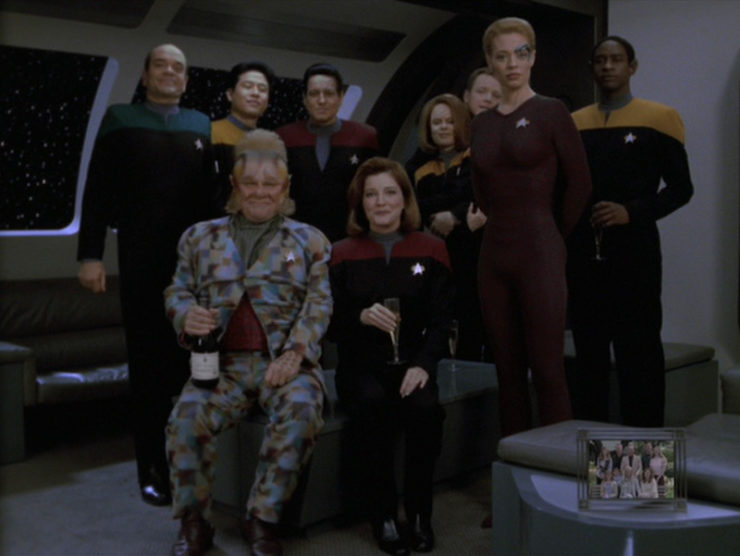
The EMH takes a holographic picture, and Neelix presents Janeway with a framed version of the picture he dug up. We then fade to the taking of that picture, with the elderly O’Donnel and her progeny.
There’s coffee in that nebula! Janeway gets a hard lesson in the difference between family history and recorded history.
Forever an ensign. Kim tells the story of an ancestor of his who piloted a sleeper ship to a solar system that turned out not to actually be there, so he had to turn around and pilot it back, while the rest of the crew was in stasis. The crew was awakened and confused as to why they never left orbit. The crew of Voyager finds this story far funnier than it actually is.
Everybody comes to Neelix’s. Neelix and Paris’ trading of historical trivia about Earth and Talax is what gets Janeway started on thinking about O’Donnel, and Neelix also is the one who helps Seven get on the right search track.
Resistance is futile. Seven mentions an ancestor of her own that she’s found: Sven “Buttercup” Hansen, a prize fighter. She is skeptical as to Neelix’s claims that there is significance to her being a descendant of his. (Neelix’s mentioning of the similarity between the names Sven and Seven is met with a Stare Of Dubiousness.)
No sex, please, we’re Starfleet. O’Donnel meeting up with a man named Henry Janeway is some pretty clumsy foreshadowing to their eventual coupling, though their conversations are entertaining.
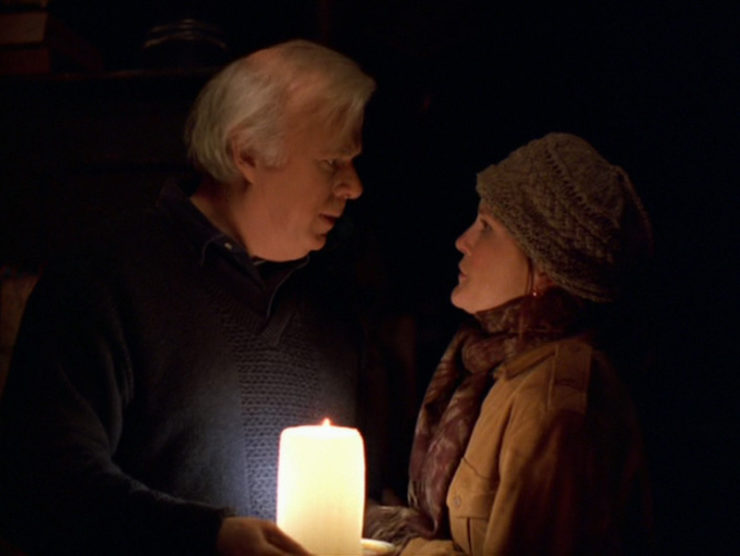
Do it.
“The holographic engineer is having problems with her program, Neelix, the Cardassian cook, is low on supplies, Seven of Twelve is regenerating, and Captain Chakotay is doing just fine.”
–Janeway’s sarcastic commentary on how history can sometimes distort reality.
Welcome aboard. Character actor John Carroll Lynch, who was in the midst of his recurring role as the title character’s brother on The Drew Carey Show, plays Moss, Bradley Pierce plays Jason, Kristina Hayes plays the reporter, and James Greene and Christopher Curry play the townsfolk O’Donnel encounters upon arrival in Portage Creek.
And our Robert Knepper moment is the great Kevin Tighe as Henry Janeway. I vaguely knew he was in a Trek episode at some point, but I was completely gobsmacked to see him here.
Trivial matters: The original notion of this episode was to have an ancestor of Janeway’s in the twentieth century encounter either Q or Guinan, with John deLancie or Whoopi Goldberg guest starring, but it mutated into a more straightforward flashback with no science fictional or Trek elements to the flashback. However, the turn of the millennium was always intended to be part of it.
The episode accurately predicted that the Y2K bug would not be as devastating as feared, though the real reason for that was because programmers worked their asses off throughout 1999 to keep it from happening. (Your humble rewatcher was married to such a programmer at the time.)
However, the episode did not accurately predict that New Year’s festivities in the 2000/2001 new year would be equally as turn-of-the-millennium focused as those in 1999/2000. Instead, the 2000/2001 new year was just another New Year’s.
Another 1999 Trek story that dealt with the turn of the millennium was the novel I, Q by John deLancie & Peter David, which had an equally inaccurate prediction for how things would go, in this case a terrorist attack on Times Square.
O’Donnel appears in The Eugenics Wars: The Rise and Fall of Khan Noonien Singh Book 2 by Greg Cox, in which we learn she was part of the project that developed the Botany Bay, the ship on which Khan and his fellow Augments were exiled.
The model of the Apollo Lunar Module that hangs from O’Donnel’s rear-view mirror was borrowed from the desk of Trek writer Denise Okuda.
Portage Creek is fictional, though there is a Portage, Indiana that is a suburb of Chicago. Portage Creek is said to be near Bloomington, so is much further south than Portage. The outdoor scenes were filmed on Paramount’s “New York” lot, with snow brought in to simulate winter.
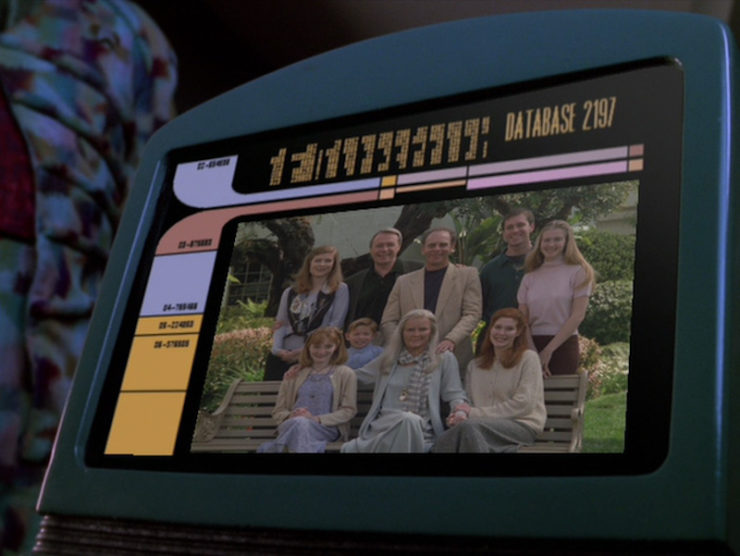
Set a course for home. “That station wagon of yours doesn’t exactly look like a sailing ship.” I wanted to like this episode more than I did, as its heart is very much in the right place, but it ultimately doesn’t quite cohere into what it wants to be.
It reminds me far too much of other episodes that tackled its themes far more successfully. “Living Witness” did so much more with the notion of history distorting the facts. DS9’s “Far Beyond the Stars” was a significantly more effective twentieth-century flashback. And DS9’s “Once More Unto the Breach” provided a far more effective colloquy on the differences between legends and reality. (I really wish Worf could have materialized in the mess hall at the end and delivered a version of his line from the latter episode: “The only real question is whether you believe in the legend of Shannon O’Donnel or not. If you do, then there should be no doubt in your mind that she was a great explorer. If you do not believe in the legend, then she was just a woman and it does not matter how she lived.”)
I wish someone had pointed out to Janeway that, even if O’Donnel wasn’t an astronaut, she was still a NASA engineer, an occupation that was only about ten percent women in 2000. I wish someone had told Henry that, if he’s the only actual open business in town, the town is going to go into economic ruin, destroying the lives of everyone in it.
When O’Donnel and Henry are talking about the pros and cons of living in the past, O’Donnel won the argument at the very beginning by saying there were no antibiotics in the classical period (not to mention no decent dental care, and oh, yeah, that women could be property), yet Henry kept going for some reason, apparently completely okay with the notion of dying from a small cut that gets infected at age twenty. It’s also really easy for an educated white guy to say that the classical period was better.
That’s another problem with the episode: it didn’t really sell me on the Henry-Shannon pairing at all. Kevin Tighe is fine as Henry, but I spent most of the episode wanting to punch him in the throat. (To be fair, that’s true about a lot of Tighe’s roles—he’s really good at playing people whose throat you want to punch.) The whole chocolate-chip-cookie thing at the end didn’t work because it wasn’t seeded anywhere in the episode. Which wouldn’t be so bad, except we spent lots of time on things like O’Donnel dreaming about the moon landing or helping Jason with videogames, none of which paid off in any way anywhere else in the episode.
In the end, this was a Lifetime Original Movie with a twenty-fourth-century frame grafted onto it. It’s still completely watchable, mainly because Kate Mulgrew does superlative work both as a frustrated O’Donnel and a devastated Janeway, because Tighe inhabits his character perfectly, and because both Bradley Pierce and especially the always-reliable John Carroll Lynch are fantastic in the roles of Jason and Moss. And, to be fair, I was completely engaged in the lives of the characters in December 2000 as I was watching it. I also must confess to getting a kick out of Paris and Neelix trading trivia about each others’ homeworlds. (I also love that they both forgot the Seventh Wonder of the Ancient World, leaving it to the ex-Borg to tell them it was the Lighthouse of Alexandria.) But it should’ve been so much more than it was.
Warp factor rating: 5
Keith R.A. DeCandido is also reviewing each new episode of The Falcon and the Winter Soldier as they’re released on this site.










